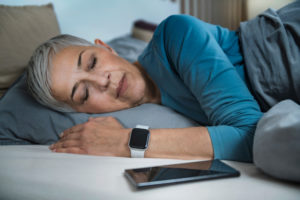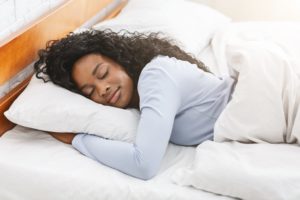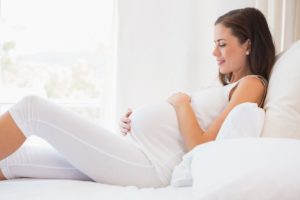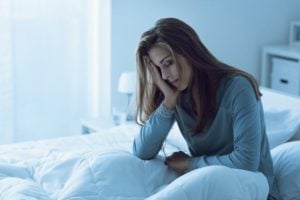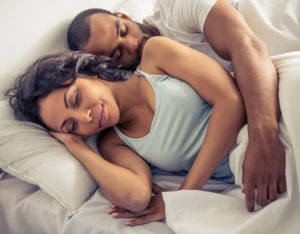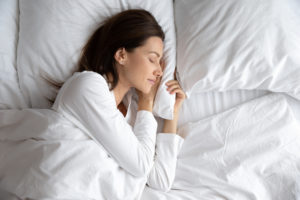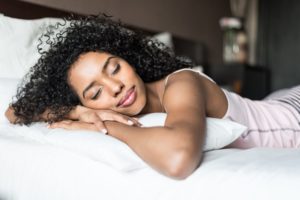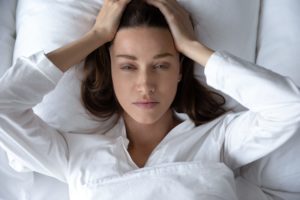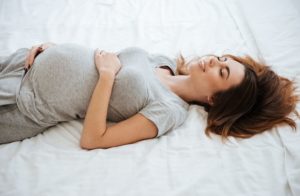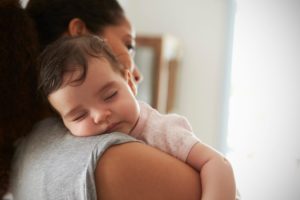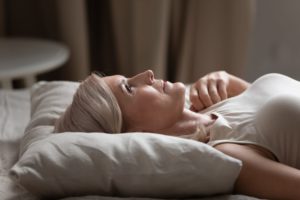When you buy through our links, we may earn a commission. Products or services may be offered by an affiliated entity. Learn more.
Do Women Need More Sleep Than Men?
For women, certain life stages—menstruation, pregnancy, and menopause—can bring hormonal shifts and sleep disruptions that may increase the need for rest. Just as important as how much sleep a person gets is how well they sleep. And since women experience sleep disturbances more frequently than men, they may not always get the restorative rest they need—potentially leading to longer time spent in bed to compensate.
Whether women need more sleep than men is an age-old debate. Does one have a science-backed reason to hit the snooze button in the morning or duck out of the midnight baby feeding? Not necessarily.
While some studies suggest slight differences in sleep patterns between the sexes, the recommended seven to nine hours of quality sleep per night applies equally to both men and women . That said, there are times in a woman’s life when additional rest may be beneficial.
A Note About Language: We do our best to use inclusive language that reflects the broad spectrum of genders. However, the vast majority of sleep research uses the binary distinction of “men vs. women” or “male vs. female.” In order to accurately report the findings, we are also using these terms until more inclusive research is available.
Is Your Sleep a Problem
If you’re consistently struggling to sleep, there may be underlying sleep issues at play. Answer three questions to better understand your sleep.
Why Do Women Need More Sleep Than Men?
Research has uncovered some fundamental differences in how men and women sleep, including the time spent in different sleep stages and the natural timing of the sleep-wake cycle. For example after going short on sleep, women are more likely to spend more time in deep sleep during their catch-up sleep, suggesting women are more sensitive to sleep loss .
Women are also thought to be more vulnerable to health effects from poor sleep, such as mood disorders or heart problems . And while women don’t universally require more sleep than men, certain issues specific to people born female can cause sleep problems and increase the risk of sleep disorders.
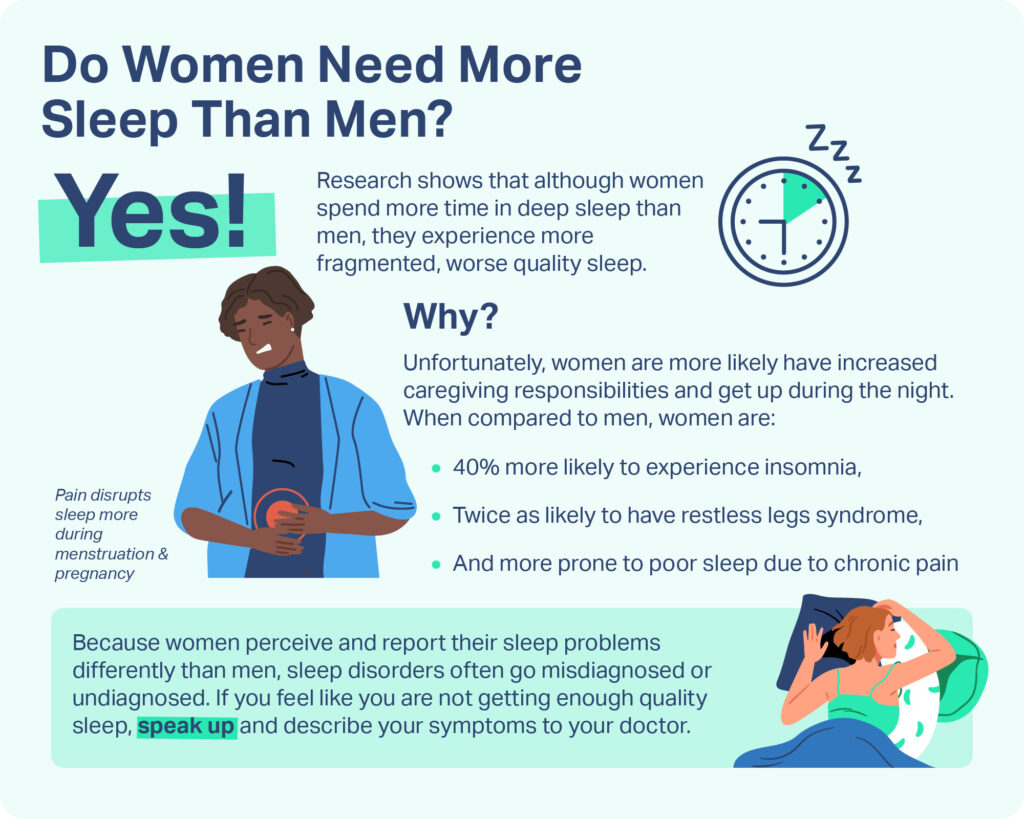
Fluctuating Hormones
One of the biggest factors affecting women’s sleep is hormonal fluctuation. Changes in estrogen and progesterone levels throughout the menstrual cycle, during pregnancy, and in menopause can impact everything from sleep quality to how long it takes to fall asleep.
These shifts can also make women more prone to insomnia, night sweats, and frequent awakenings—leading to less restful sleep and, at times, a greater need for recovery.
Menstruation
For people who menstruate, fluctuating hormones throughout their cycle directly affect sleep quality and time spent in different sleep stages . These changes are even more noticeable in those with premenstrual syndrome (PMS) and premenstrual dysphoric disorder (PMDD), which are marked by more intense menstrual-related symptoms and restless sleep. Still, even those without PMDD experience poor sleep quality in the leadup to their period.
Pregnancy
Sleep is incredibly important during pregnancy. Poor or insufficient sleep during pregnancy has been linked with a higher risk of preeclampsia, gestational diabetes, emergency C-section or longer labor, preterm birth, and postpartum depression .
Unfortunately, it’s hard to get quality sleep while pregnant. Not only are they dealing with back pain, nighttime bathroom breaks, heartburn, and discomfort from fetal movement, but their hormones are also directly affecting sleep quality. It’s not uncommon for pregnant people to develop restless legs syndrome, and sleep may also be affected by anxiety surrounding this significant life change .
An estimated 40% of pregnant people experience symptoms of insomnia by the third trimester . These sleep issues may persist as they start taking care of a newborn with an irregular sleep cycle — often resulting in even more daytime sleepiness, particularly for those who are breastfeeding.
Menopause
As they approach menopause, women may find it hard to fall asleep or stay asleep . Changing levels of the sex hormones estrogen and progesterone and the sleep hormone melatonin contribute to sleep difficulties . Many people experience nighttime awakenings from hot flashes or “night sweats.” Menopause also increases a person’s risk of experiencing sleep disorders like obstructive sleep apnea, insomnia, and restless legs syndrome.
If you don’t have a doctor, Midi Health is a virtual care clinic focused on helping women navigate perimenopause and menopause. Midi’s trained clinicians and world-class experts in women’s midlife health provide patients with personalized care for hot flashes and night sweats, moodiness, anxiety, brain fog, weight gain, and other symptoms of hormonal change, including sleep issues. Treatments may include hormonal and non-hormonal medications, supplements, and lifestyle coaching.
Mood and Sleep Disorders
Insomnia, anxiety, and depression are intertwined and all three conditions are more common in women . Anxiety and depression can make it harder to fall asleep or cause people to wake during the night or too early in the morning. As a result, people with these disorders may need to sleep longer to make up for their non-restful sleep.
Another sleep disorder, obstructive sleep apnea (OSA), is more common in men. However, many women have this condition and don’t get the treatment they need, as their symptoms don’t always match what doctors have been trained to recognize . Thus, women with undiagnosed OSA may appear to need more sleep.
Do Women Actually Sleep More Than Men?
Research suggests that women do sleep slightly longer than men, although the difference is very small. But while women may sleep longer, their sleep may be more frequently interrupted.
One study found women sleep an average of 11 minutes more than men, with variations throughout life stages . Women are more likely to get up during the night to care for other family members, which disrupts sleep. Women are also more likely to get part of their sleep from naps, possibly to compensate for disturbed nighttime sleep.
On surveys, women are more likely to report not sleeping well . Yet when monitored in a sleep lab, women appear to have better sleep quality than men, spending more time in deep sleep and more total time asleep. There may be several reasons for this paradox :
- Internal Clock: Biologically, women are programmed to sleep slightly earlier than men. If women are forced to sleep a little later to meet society’s schedule, this may explain why they don’t feel like their sleep is 100% restful.
- Co-Existing Conditions: Women may experience non-refreshing sleep due to external factors, like low mood or anxiety.
- Incomplete Data: Tests used to measure sleep quality were designed for men, so they might not be capturing some element that characterizes poor sleep in women. Or, men may underreport their sleep time because of gendered societal expectations.
Since the vast majority of studies have focused on men, there’s a lot we don’t know about sleep in women. Studies exploring sleep differences for non-binary and transgender people are even more limited.

Are You Getting Enough Sleep?
Regardless of gender, most adults don’t get enough sleep each night. Around one-third of adults get less than seven hours of sleep a night on a regular basis. The best way to know if you’re getting enough sleep is whether you feel refreshed when you wake up.
Tips for Better Sleep
If you’re having trouble sleeping, star by improving your sleep hygiene, a set of everyday habits that can help improve your sleep. Good sleep hygiene involves :
- Going to bed and waking up at the same time every day
- Keeping the bedroom cool, dark, and quiet
- Establishing a relaxing bedtime routine
- Avoiding naps, caffeine, tobacco, and alcohol in the late afternoon and evening
- Getting regular exercise
- Avoiding big meals before bed
- Using the bedroom only for sleep and intimacy
- Avoiding screen time in the leadup to sleep
During certain life stages like pregnancy or menopause, you may find it helpful to take a more specific approach to improving sleep. For example, a pregnancy pillow may help you feel more comfortable with the baby bump, or cooling pajamas may help ward off menopausal night sweats. If sleep difficulties continue, speak to your doctor about treatment options.

Still have questions? Ask our community!
Join our Sleep Care Community — a trusted hub of sleep health professionals, product specialists, and people just like you. Whether you need expert sleep advice for your insomnia or you’re searching for the perfect mattress, we’ve got you covered. Get personalized guidance from the experts who know sleep best.
References
14 Sources
-
Consensus Conference Panel, Watson, N. F., Badr, M. S., Belenky, G., Bliwise, D. L., Buxton, O. M., Buysse, D., Dinges, D. F., Gangwisch, J., Grandner, M. A., Kushida, C., Malhotra, R. K., Martin, J. L., Patel, S. R., Quan, S. F., Tasali, E., Non-Participating Observers, Twery, M., Croft, J. B., Maher, E., … Heald, J. L. (2015). Recommended amount of sleep for a healthy adult: A joint consensus statement of the American Academy of Sleep Medicine and Sleep Research Society. Journal of Clinical Sleep Medicine, 11(6), 591–592.
https://pubmed.ncbi.nlm.nih.gov/25979105/ -
Mong, J. A., Cusmano, D. M. (2016). Sex differences in sleep: Impact of biological sex and sex steroids. Philosophical Transactions of the Royal Society, 371(1688).
https://pubmed.ncbi.nlm.nih.gov/26833831/ -
Pengo, Martino F et al. “Sleep in Women Across the Life Span.” Chest vol. 154,1 (2018): 196-206. doi:10.1016/j.chest.2018.04.005
https://pubmed.ncbi.nlm.nih.gov/29679598/ -
Jehan, S., Auguste, E., Hussain, M., Pandi-Perumal, S. R., Brzezinski, A., Gupta, R., Attarian, H., Jean-Louis, G., & McFarlane, S. I. (2017). Sleep and premenstrual syndrome. Journal of Sleep Medicine and Disorders, 3(5), 1061.
https://www.ncbi.nlm.nih.gov/pmc/articles/PMC5323065/ -
Hoffmann CS, Hoegholt NF, Vuust P, Kringelbach M, Jespersen KV. The effect of music on pregnancy-related insomnia: A systematic review and meta-analysis. Midwifery. 2025;142:104294. doi:10.1016/j.midw.2025.104294
https://pubmed.ncbi.nlm.nih.gov/39826401/ -
Efficacy of online mindfulness for the treatment of insomnia in pregnancy: A randomized clinical trial
https://pubmed.ncbi.nlm.nih.gov/40343904/ -
Jehan, S., Masters-Isarilov, A., Salifu, I., Zizi, F., Jean-Louis, G., Pandi-Perumal, S. R., Gupta, R., Brzezinski, A., & McFarlane, S. I. (2015). Sleep disorders in postmenopausal women. Journal of Sleep Disorders & Therapy, 4(5), 212.
https://pubmed.ncbi.nlm.nih.gov/26512337/ -
Troìa L, Garassino M, Volpicelli AI, et al. Sleep Disturbance and Perimenopause: A Narrative Review. J Clin Med. 2025;14(5):1479. Published 2025 Feb 23. doi:10.3390/jcm14051479
https://pubmed.ncbi.nlm.nih.gov/40094961/ -
Decrinis C, Hofmann K, Bitterlich N, et al. Sleep disorders and psychological comorbidities in women with polycystic ovary syndrome – a cross-sectional study. Arch Gynecol Obstet. Published online May 13, 2025. doi:10.1007/s00404-025-08049-9
https://pubmed.ncbi.nlm.nih.gov/40358729/ -
Wimms, A., Woehrle, H., Ketheeswaran, S., Ramanan, D., & Armitstead, J. (2016). Obstructive sleep apnea in women: Specific issues and interventions. BioMed Research International, Article e1764837, 1–9.
https://pubmed.ncbi.nlm.nih.gov/27699167/ -
Burgard, S. A., & Ailshire, J. A. (2013). Gender and Time for Sleep among U.S. Adults. American sociological review, 78(1), 51–69.
https://pubmed.ncbi.nlm.nih.gov/25237206/ -
Nowakowski, S., Meers, J., & Heimbach, E. (2013). Sleep and women’s health. Sleep Medicine Research, 4(1), 1–22.
https://pubmed.ncbi.nlm.nih.gov/25688329/ -
Liu, Y., Wheaton, A. G., Chapman, D. P., Cunningham, T. J., Lu, H., & Croft, J. B. (2016). Prevalence of healthy sleep duration among adults–United States, 2014. MMWR. Morbidity and mortality weekly report, 65(6), 137–141.
https://pubmed.ncbi.nlm.nih.gov/26890214/ -
Office on Women’s Health, Office of the Assistant Secretary for Health. (2014, May 27). Getting enough sleep.
https://www.girlshealth.gov/body/sleep/index.html



